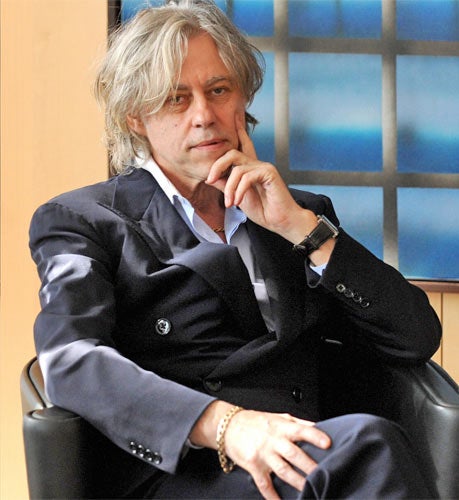The Week in Radio: The BBC should never be short of a Bob or two

Celebrities. They're everywhere. Packing out Desert Island Discs, emoting on the interview shows, attached like a lucky charm to every programme proposal. Don't you sometimes think, 'What do actors and singers have to say that's so special?' There are times when you wish Celebrity Culture could be replaced by Clerical Culture, or Science Culture or I don't know, Poet Culture. In Shelley's time, poets were the "unacknowledged legislators of the world", but now it's the celebs who rule the airwaves. Given, though, that we must exist in Celebrity Culture, thank heaven for celebrities like Bob Geldof and Michael Sheen.
"I hate listening to myself, period. I hate pictures of myself and I won't listen to anything on television," was Geldof's endearing introduction to Meeting Myself Coming Back, a clever format for which radio is ideal. The idea is for John Wilson to play a selection of archive clips and then oblige the subject to meditate on them. What might for some celebs prove an invitation to hard-core narcissism, in Geldof was a revelation. Wise, self-searching, frankly even self-flagellating, the most affecting parts came when he talked about his childhood ("family dynamic was grim") and his turbulent private life.
Expressed in his trademark mordant tone ("I sound, as ever, ridiculous"), he relived his Band Aid experiences, recalling how Mother Teresa was a "wily old bird, very media hip" and at one point, on the subject of African slums, breaking down. "Listening to it now... " he stuttered, "you get overwhelmed with the analysis of why it should happen... but... it was unspeakable." Otherwise endlessly articulate, he spoke with an extraordinary poetry about the most difficult things. Of the death of Paula Yates he said, "I was beyond despair, the pain was beyond immensity, universes of grief, my head was crowded with loss." Such lyricism is a rare thing to hear on radio.
While sticking to my thesis that we are far too entranced by the meditations of actors, I have to admit that Michael Sheen is a fabulous exception to the rule. When 6Music got him to play DJ in A Month of Sundays, he came across not only as funny and intelligent, but as frankly a damn good DJ, riffing on Jack White of The White Stripes: "He has the whole history of rock music springing out of his fingertips" and introducing us to "the greatest singer in the world", Qawwali singer Nusrat Fateh Ali Khan. Indeed he recalled how when listening to him in the car, he "reached almost a religious ecstasy", a level of enthusiasm you rarely hear from say, Chris Evans or Ken Bruce.
A few hundred years ago, singers were made of different stuff. Feathery stuff, in fact. In a genuinely eclectic and fascinating little documentary, The Bird Fancyer's Delight revealed how in the 18th-century birds were trained to sing specific dance tunes, like waltzes and gavottes, in order to act as avian record players. Musician Sarah Angliss unearthed a set of manuals on how to train the baby bird. "Begin with a two-month-old blackbird. He needs a moderate breakfast and supper and hang in his sight a lively worm as a reward for good behaviour." If prevented from hearing the songs of their own species, some birds turn to humans as the next best thing and will copy whatever they hear.
The European Bullfinch is the star. "They're highly motivated to get it right. They're like children learning a nursery rhyme; if they get it wrong, they go back and start it again," explained Professor Tim Birkhead, an expert in bird behaviour. "They become sexually imprinted on their owner. If I get this song right, you'll love me. It's a mutually reinforcing system." Utterly enchanting, and a little bit sad that 200 years of bird technology later, all we have now is Twitter.
Subscribe to Independent Premium to bookmark this article
Want to bookmark your favourite articles and stories to read or reference later? Start your Independent Premium subscription today.

Join our commenting forum
Join thought-provoking conversations, follow other Independent readers and see their replies